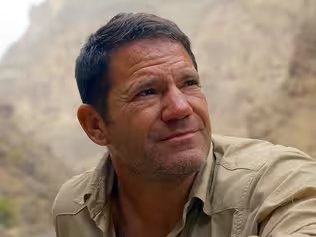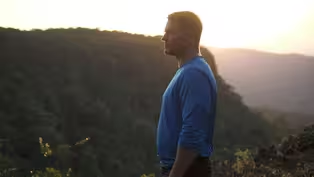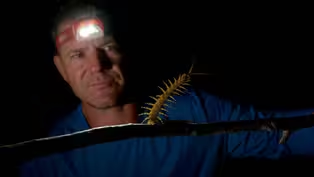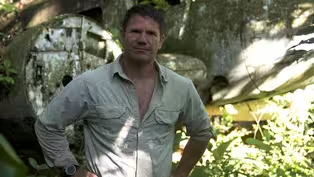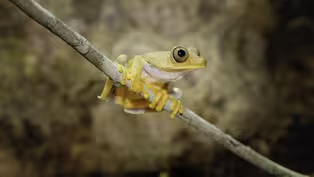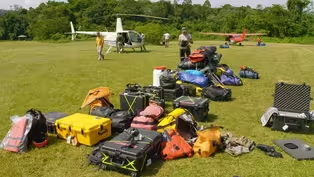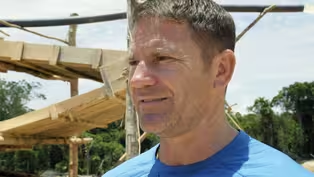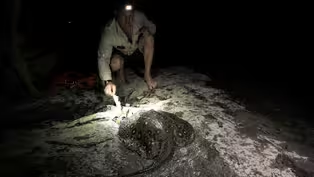
Suriname – Lost World
Season 1 Episode 3 | 48m 28sVideo has Closed Captions
Travel to the Guiana Shield, where Steve Backshall searches for new wildlife.
Travel to the Guiana Shield with Steve Backshall, whose mission is to discover its abundance of wildlife and natural wonders. He travels deep into the untouched jungle, finding animals that have never encountered humans.
Problems playing video? | Closed Captioning Feedback
Problems playing video? | Closed Captioning Feedback

Suriname – Lost World
Season 1 Episode 3 | 48m 28sVideo has Closed Captions
Travel to the Guiana Shield with Steve Backshall, whose mission is to discover its abundance of wildlife and natural wonders. He travels deep into the untouched jungle, finding animals that have never encountered humans.
Problems playing video? | Closed Captioning Feedback
How to Watch Expedition
Expedition is available to stream on pbs.org and the free PBS App, available on iPhone, Apple TV, Android TV, Android smartphones, Amazon Fire TV, Amazon Fire Tablet, Roku, Samsung Smart TV, and Vizio.
Buy Now
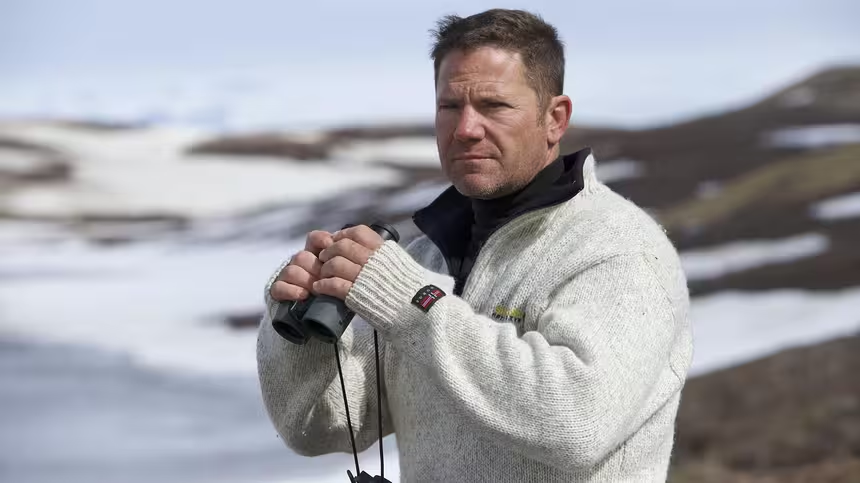
Meet Steve Backshall
Steve Backshall takes PBS behind his adventures, explains how the expeditions are chosen, and explores our role in protecting these magnificent locations.Providing Support for PBS.org
Learn Moreabout PBS online sponsorship-I'm Steve Backshall... -Want to start?
...a naturalist and explorer.
Watch your rope!
The thought of that coming down on my head - helmet won't make any difference.
You will dead in an instant.
Whoa!
[Steve] With an expert team... [Aldo] That is a tight landing spot down there.
..I'm pushing deep into So uth America's pristine jungle.
This is the last great rainforest left on the planet.
Who knows what we're going to find here?
Taking on dangers and hardships that have thwarted generations of explorers... Ah!
So close!
...to find a lost world of natural treasures... No way!
...never before seen by human eyes.
We came here looking for lost worlds.
We found one.
Never seen anything like it.
We've flown for an hour now over forest and there's just been nothing below us for miles and miles in every direction.
Mountains that have never been climbed, rivers that no one's ever been down.
You could just drop a pin in the map and find a place that no human being has ever been to before.
Since the time of Christopher Columbus, every generation of explorer has been drawn to South America's forests and mountains.
Many arrived in search of Eldorado, a mythical, lost city of gold.
But the primeval landscape we're flying over has repelled even the most determined pioneers.
South America's Guiana Shield stretches over 2 million square kilometres.
It's home to one of the largest pr istine jungles on the planet.
We're heading into its heart.
Just looks like adventure, doesn't it?
Does make you think what would happen if the plane went down.
I don't want to think about that.
[pilot] All stations, Bravo Sierra.
Approaching for landing, 3.5 miles.
-[Aldo] Coming in.
-[Steve] Oh, my days!
Strewth!
This remote landing strip was built in the 1950s during a large-scale operation to push into these forests.
We are hell and gone from nowhere.
Whoo-hoo-hoo-hoo!
These relics are all that are remain of this bygone era of exploration.
It's perhaps not the kind of thing that you want to see.
It's almost like a... a warning.
Now, I want to succeed where so many turned back and lead an expedition into this lost world, from the mountain tops down into the lowlands, in search of places where humans are still to set foot.
But I'm not in search of gold.
My treasures are the natural wonders still waiting to be discovered.
This landing strip will be our base camp.
From here, with the help of expert jungle pilots and local knowledge, we'll head to the start of our expedition.
And where we're going is somewhere very special indeed.
[inspirational music] This is the Tafelberg.
It means "table mountain" and for good reason.
The top of it just looks like a great big, black tabletop.
It has vertical rock walls hundreds of metres high.
One of the few people to have set down here before is field biologist Vanessa Kadosoe.
-It looks pretty amazing.
-Yeah!
Vanessa was part of a scientific survey, over six years ago, that studied the flat tabletop.
But the sheer sides have been a barrier to exploration below.
Mountains like these are full of waterfalls, gorges, canyons.
Some of the most stunning and beautiful places you'll ever see.
And because it's so difficult to move around on them, many of these places have never before been explored.
Our objective is to find a route down into unknown territory.
Joining me is Aldo Kane.
He'Fs a ropes expert who will help us reach the most inaccessible parts of this mountain.
Ooh!
That is a tight landing spot down there.
All good?
-He's a good pilot, isn't he?
-Yeah.
-Okay, we're all set?
-Yeah.
Hey!
Hey!
[birds twittering] [Aldo] What a view.
-Very, very dramatic.
-Yeah.
Amerindian trail-cutters Mani and Uwawa have also joined us.
They were on Vanessa's previous expedition.
Where is the closest village?
[Mani and Vanessa speak regional language] [Vanessa laughs] Wow!
He says walking would take, like, ten months.
-Ten months?!
-Yeah.
[laughter] The closest village is ten months away?
I think it's very far then.
I can honestly say this is the most remote I've ever been.
-Yeah!
-[laughter] [Uwawa makes whooping noise] [Vanessa] So, Uwawa, he's calling a monkey.
So, when they do this, when there's a group nearby, they hear that and they start calling back.
[monkeys whooping] That's cool.
[monkeys whooping] -Monkeys are calling back.
-[Uwawa calls] [monkeys whooping] It's a tantalising taste of the discoveries waiting for us below.
We follow Mani and Uwawa down a cola-brown river drawn by a thundering roar.
[roar of water] This waterfall is what we've been looking for.
An entry point to an unexplored gorge... and the valleys and forests beyond.
-What do you think?
-I think it's incredible.
It is "Lost World", isn't it?
[Aldo] Be amazing to get down there and have a look.
[Steve] Yeah.
It makes my tummy go a bit funny standing here, I have to admit.
I'm quite glad I'm hanging on to something.
It's too late in the day to attempt a descent, so we set up camp.
[Aldo] Looks like no rain tonight.
[Steve] No rain, definitely no rain.
Unquestionably.
I mean, it's not like we're a 1,000 metre high mountain in the middle of the rainforest.
Why would it rain here?
-It's never going to rain here.
-[Steve laughs] Dry season.
Uh, incidentally, I think this mountain gets 12 metres of rain a year.
-12 metres?
-12 metres.
In the UK, we measure our rain in centimetres.
[laughter] [bird twittering] Finally, we can take a moment to enjoy our spectacular surroundings.
[birds twittering] Look at that!
Can you see him?
There are two tiny humming birds.
And they're right below me, right now.
I, honestly, did not expect this.
He's darting in and out of the water of the waterfall.
That's just so beautiful.
Honestly, I could sit here and watch this for hours.
As darkness starts to fall, we're keen to find out what other animals inhabit these isolated tabletops.
So we head out with expert biologist Vanessa.
[Aldo] Oh, he's amazing looking, isn't he?
-[Aldo] Look at those eyes.
-[Vanessa] I like his eyes.
-Beautiful.
-Yeah.
[Aldo] So this is a little scorpion.
Obviously, I have no idea...
I didn't stay at school long enough to work what this is.
It could definitely give you a bit of a sting, something that size.
[Vanessa] Yes, it will.
I've seem big Marines floored by... -[Vanessa] Oh!
-a small scorpion sting before.
[Aldo] Good spot.
Some of the animals here are not always what they seem.
Ah!
We need a bigger stick.
In this part of the world, it's always best to be cautious.
Whenever you see a snake that has any combination of black, yellow and white bands, because it's either a highly venomous coral snake, or it's something that's imitating that coral snake.
And it's very, very difficult to tell, be 100% sure.
I've seen him settle down a little bit.
Most animals... would have to be pretty brave to take a chance at knowing which is which.
This one here, by looking at the size of the eyes and the scales between the eyes and the nose, is non-venomous, but by taking on those same colours, everything else leaves them alone.
A bite from a real coral snake out here would be very bad news.
We all check our tents cautiously before we turn in for the night.
[animal noises] This morning, we're hoping to be the first people to explore this gorge.
But in the cold light of day, the drop looks even more daunting.
I think it looks really exciting.
I think it looks very committing.
There is zero chance of a rescue.
We're completely on our own.
-Situation normal.
-[laughter] Aldo and I need to recce the route.
Graham, the cameraman, will be joining us, as he's most experienced on the ropes.
The thing about rigging is more just problem solving, cos there's never a right or a wrong answer.
Unless it fails.
Set?
It takes over 100 metres of rope to reach the bottom.
[Steve groans] Yeah, that's good.
Slung below me, I have enough kit to recce the gorge for two days.
I'm heavily laden and need to tread lightly on this fragile rockface.
Lots of loose rock here, mate!
It's pretty loose down there, to say the least.
[Aldo] Whoa!
I hadn't mentally prepared myself for this bit to be dangerous.
Um, and if I'm honest, it's freaking me a little bit.
Coming down here, the ropes are going through rocks that are massive and are very, very loose.
And any of those come down on to our heads and the helmet won't make any difference.
You will be dead in an instant.
[Aldo] Watch your rope!
[rock clatters] Oh, that rock just bounced down right where our ropes are.
So I'll have to do a lot of checking when I get down there.
Our ropes are lying on a ledge that's still 30 metres short of the bottom.
If the rockfall has damaged th em, our descent will be over.
I'm doing good, buddy.
I'm just down to where those rocks impacted our ropes.
So I'm going to give them a good looking over.
-Aldo, go ahead.
-How are the ropes looking?
Yeah, the ropes are a little bit gritty and you can see where the rope's taken the impact, But it hasn't cut through the cord at all.
I'm fine carrying down on them.
Understood.
Keep me posted.
[Steve] The final section is straight down the line of the falls.
Here, the power of the water has scoured the rockface clean.
The rock that I've got my feet on right now, it's incredibly ancient sandstone laid down about 1.8 billion years ago.
The most remarkable thing about this rock though is that you don't find any fossils in it, none whatsoever.
Because it was formed before there was any life on Earth.
It completely blows my mind whenever I think of that.
This rock is some of the most ancient left on the planet.
[inspirational music] This place is straight out of Arthur Conan Doyle's "Lost World", a book I read as a boy about an expedition to a tabletop mountain, where prehistoric animals still roamed.
But it's stupefyingly beautiful.
There is an incredible rainbow just directly behind me.
That was fiction, this reality is even more fantastical.
We came here looking for lost worlds.
We found one.
Graham and Aldo follow my route down.
Whoo!
Just gets better and better!
Check this.
Now, we want to push further and reach the jungle at the end of this gorge.
[Aldo] Oh, wow!
That's where I think we need to go.
If we can push out through that gorge today, once we're at the bottom, I think it heads down and out into the forest.
Just rigging an abseil up down into the next section of the gorge.
We're sort of running low on kit, so we're, um... just making and doing with what we've got.
Got my first proper look down our gorge.
It looks pretty grim and intimidating.
But doable.
I want to get moving.
I'm starting to get quite cold.
So I'm quite keen to push on down through here, see if we can find somewhere to camp.
Oh, that's cold!
Oh!
Oh, no!
Our way is blocked by a five metre drop.
But we've used up all our rope.
Oh, it's just tantalising.
It's right there in front of me.
I can see the sunlight up ahead and the way out of the gorge but we can't get there.
End of the road!
With light fading, we'll have to spend the night in this gorge and try to find a new route into the jungle tomorrow.
-[waterfall roars] -So, here we've got... a spot that we can sleep.
Or a spot that we can at least lay down for the night.
Whether we actually sleep or not is another thing.
We've been wet and cold all day.
Now, we can finally change into some dry clothes.
[rumbling] [stones falling] [loud bang] That's where we were just... That's where we were just standing.
This gorge is an accident waiting to happen.
But for the moment, we're trapped.
Topside, topside, Aldo over.
Aldo radios up to our producer, Anna, with an update.
-Go ahead, Aldo.
It's Anna here.
-Ah, we're fine.
We are tucked under a, um... a bit of an overhang.
-[Anna] Okay, and the plan is?
-The plan is... we have to spend the night here with... daylight goes.
We'll probably head up first light in the morning.
Over.
Roger that.
I'll keep the radio on.
Let me know when you've made a decision and when you're on your way.
Over.
It's going to be a long night.
[stones falling] And we're not alone.
Can you see it?
So, this is why... you should always shake out your boots whenever you're on expedition.
I've been drying mine out cos they were soaking wet, and I picked one up and this wriggled out of it.
It's a scolopendra centipede.
They're venomous.
And when they bite, it really, really hurts.
So it has a nerve toxin, which is incredibly painful.
They're properly creepy and this one was in my boot.
Scolopendra belong to a family of animals that were among the first to walk the Earth, 420 million years ago.
As we turn in, I can't help thinking what other living dinosaurs are waiting to be discovered in these ancient forests.
We're up early to start the long climb back to safety.
[sighs] Aah!
Ooh, yes!
Absolutely incredible.
What a place.
These table mountain tops have so many wonders, so many nooks and crannies where people have never been to before and it feels very, very special going into one for the first time.
But to reach the unexplored lowlands, we need to find a safer route.
With Mani and Uwawa guiding us, we head off across the tabletop.
This must be the riverbed that runs to the top of the falls?
Yes, it is.
This is the riverbed.
The nearby gorges all look unstable and strewn with rockfall.
So we make a new plan.
This looks like our ride.
We're returning to base camp.
The pilots will fly west to scour hundreds of kilometres of dense forest in search of a new landing site.
Wicked.
All right.
Yeah.
Fingers crossed.
Aldo and I are heading east.
Though the interior of this ancient forest remains untouched, at its edges our modern world is starting to encroach.
-Is that it?
-Yeah.
We're checking out reports that gold miners are pushing into these forests.
It's way bigger than I expected.
We're heading in on the ground to try and meet these modern-day prospectors.
I have some friends here who have contacts, that, hopefully, can get us to the right place to see what's going on.
The mines in this area are operating illegally, so we've agreed not to reveal the identity of the workers.
Oh, wow, yeah.
Look.
We're still not sure how the miners will react to our arrival.
So we've just rolled into the mining camp.
We need to tread carefully because everyone here is here illegally and what they're doing could get them locked up for a long time.
So, I think the first thing to do is just shake some hands, smile and just get a handle on what's going on here.
-Aldo.
How are you?
-Aldo.
How do?
-Hi.
Steve.
Nice to meet you.
-Hi.
I'm all right.
[laughs] So are you the boss here?
So what do you do here?
Can you show the job you do?
The miners are much more relaxed than we expect.
We're being given full access inside a clandestine industry.
It's like a frontier town.
This is the modern-day Gold Rush really.
And it's staking a claim on a piece of land to dig, exploit and then leave behind.
So the guys down here in the pit are blasting away with high-pressure hoses, blasting down all of the ground, which is going to get sieved out and all the tiny flakes of gold that are in it will be separated out.
This silty water is pumped up into trays, where the heavier sediment containing the gold is collected.
So once they've got enough of this material that has the gold in it, they separate the gold out using mercury.
And mercury is extremely poisonous and some of that leaches out into the water.
The water flows into the streams and it kills everything.
Builds up in the fish, builds up in the people living downstream of here.
It's so difficult.
You know, I'm talking to the guys here and they're just trying to make a living and they're decent, nice people and... you can't really blame them for what they're doing.
This is what they do for a job and it's a hard life.
The big problem though, a relatively small mine like this, that's only generating a few kilos of gold, could be compromising hundreds if not thousands of miles of forest and, more importantly, of the waterways.
Scientific reports show that 6,000 kilometres of waterways across the Guiana Shield have already been contaminated by gold mining.
The pristine forests that remain are incredibly precious.
And that's why it's so important to explore them, to reveal their natural treasures before it's too late.
The pilots have found an alternative landing site in the jungle, two hours from base camp.
We'll be the first people ever to set down there.
This is the last great rainforest left on the planet.
You see nothing, no signs of civilisation whatsoever, no imprint from human beings.
Once on the ground, we'll be on our own for around ten days.
From our Drop Zone, we must hack our way down a small, unnamed creek.
If we make it through, we'll reach a larger river called the Lucie.
From here, it's an endurance paddle to the first sign of civilisation - the Amerindian village of Amatopo.
Who knows what we're going to find here?
Our Drop Zone is just big enough to get the helicopter in.
This is the middle of nowhere!
-Thank you very much, Ricky!
-You're welcome.
To help us navigate this unknown territory, we've flown in a new local team.
Jan Willem and Diego Graanoogst are jungle survival experts.
They learnt their skills from living with Amerindians at Amatopo.
But even they haven't penetrated this deep.
Nobody ever came here before.
Unbelievable place.
Their jungle knowledge will also be key to finding what lives here.
I'm going for a stand-up paddle board.
The hope is, this will lift me up above the height of the river.
Give me a better chance of seeing wildlife.
I'm hoping this could be a bit of a revelation.
Finally, we take our first paddle strokes into this primordial forest.
We don't know what lies ahead, but this jungle could contain dangers, discoveries or both.
The first explorers in these forests were naturalists, biologists - people like Darwin, Alfred Russell Wallace.
This was mostly in the mid- to late-1800s and they were discovering new things every single day.
And as a kid, I can remember reading their stories and being gutted that I would never have a chance to do that.
That that all happened in a different age, but... it turns out you still can, here in these forests, to the north of the Amazon.
[Aldo] This area truly does feel untouched.
That's pretty amazing.
[Steve] Gliding silently down this creek, my paddle board helps me to get closer to the wildlife.
When you're on the river, you can paddle clean past things because they just look so like everything else that's around you.
We call anything that's in the water that looks like a croc but isn't, a loggerdile.
It's actually a smooth-fronted caiman.
So motionless in the water... that you'd never see him, until he moves!
[animal call] Wildlife can be hard to spot in the thick jungle.
But we can hear it all around us.
Spider monkeys.
They're really curious.
[bushes rustling] There's something moving close by.
Where was it?
[whistles] Diego and Jan use an Amerindian trick to draw it out into the open.
[whistling] [whistles] [Steve] No way!
No way!
That is absolutely amazing!
Tapir.
Tapir, right here, right here.
[whistling] This animal has never seen human beings before.
Doesn't know what we are.
Doesn't know to be afraid of us.
And that is a very, very special thing.
This is the largest wild animal in South America.
And to see one up this close is so, so rare.
This is one of the first animals that gets hunted out as soon as human beings move into an area.
It's a privileged glimpse into the life of this shy giant... and what makes this forest so special.
This is unbelievable.
I cannot believe how much wildlife we've seen already.
We've only been on this river for a couple of hours.
There's a long way to go.
But almost immediately, you get a sense of the huge task ahead.
This is not ideal.
Any one of these little stumps could rip the bottom out of these boats.
-Oh!
-Well done, Jan. Good effort!
It takes the rest of the day to navigate through tangles of fallen trees.
Rule number one in the jungle is don't fight the jungle.
You never win.
You've just got to go with the flow.
If you do two kilometres, you do two kilometres.
If you do ten, you do ten.
It's slow going and frustrating.
Time to make camp.
One great thing is I am so impressed with our local guys.
-Yeah.
-Jan and Diego.
They're super hard working, really, really good wildlife spotting.
I think they're going to be gold dust.
[Aldo] Nice, nice.
Look at the size of that.
Look at the teeth on it as well.
This wolf fish is very, very good eating.
Uh, and this'll be smoked over the fire.
It an ancient Amerindian way of preserving fish in this tropical climate.
So you'll leave this smoking all night?
Yeah, all night till the morning.
-It'll be ready for breakfast?
-Yeah.
But the commotion and the smell of blood in the water attracts predators into camp.
[Steve] Oh, look at that one!
Look at that one!
Right, green.
-Holy moly!
-That's amazing.
Jan?
Jan, can I get the net, please?
[Jan] Hold him.
Yeah, yeah, I'm watching out.
Watching, watching.
It's not going to do it any harm being out of the water for a short period of time.
But it could do us a lot of harm.
Stingrays are in the shark family.
They're essentially just a completely squashed freshwater shark.
But they don't bite you.
Instead, they sting.
Got to be so, so careful doing this.
On the tail here... which comes down to a stinger.
The barb itself is serrated, incredibly sharp.
And as it lashes through the wound, it leaves behind a venom that creates enormous pain.
I've met people who've stepped on these stingrays and been stung, and they've lost complete use of their leg and lost enormous amounts of tissue.
And they're here in these rivers in numbers that I have simply never seen before.
There are absolutely thousands of them.
Right, I'm going to get him back in the water.
[Aldo] Steve.
Eye shine.
Where?
Oh, yeah.
Croc.
It's the biggest caiman we've seen.
I'm going to risk a closer look.
Yeah, got it.
As we're getting further down the river, we're getting different kinds of crocodilian.
So this is a spectacled caiman.
When they're fully grown, he could get to be three metres in length and be a really decent size.
To have lots and lots of apex predators, it means you've got to have lots and lots of food.
So if you've got a lot of crocs around then it means the rivers are full of fish.
And that's a really good sign for how healthy this river is.
As if there was any doubt.
Okay, fella.
Large predators are in decline around the planet.
It's a rare and wonderful sight to see them thriving.
We must tread carefully as we head downstream.
We're up early and making good progress.
The deeper into the forest we paddle, the further we are from our Dr op Zone and potential rescue.
We've hit a snag.
Quite a bit snag, actually.
Our river was just broadening out and then, suddenly, it just ties itself up into tiny little... creeks that go nowhere.
We're, all of a sudden, in the middle of the jungle, with no way on.
Oh, I dread to think what will happen if we can't paddle on from here.
We are stuck.
Our unnamed creek has come to an abrupt end.
We spread out, looking for a way through.
-Dead end?
-It's a dead end.
Just rocks.
Um, so now we're walking, walking everything back up.
If we can't find a route forward, our only option is to turn back and drag our boats upriver to the heli landing site.
But we have technologies that explorers of old didn't.
We're putting up the camera crew's drone.
So if you could send it that direction, down that stream first and see if it goes anywhere.
So that's the main stream that we came in at.
Looks like it ends in an oxbow lake.
-[indistinct] -No.
If we spin it now and start heading south.
That must be the river there.
Oh.
Way far off.
It's a way forward.
We've got to crack on.
We've got a lot of ground to cover.
And this next bit could be tricky.
After two hours, we break out of the forest, and we're back on the main channel.
Yeah, baby!
It's going to be a super camp.
It's our time to relax... -[Steve laughs] -Oropendola nests.
...and spruce up.
Just better to clean my clothes on me before I clean myself.
Just having a wash in the shallows and all of a sudden these massive fish came to within just... this far away from me.
I'm going to try and get some shots of them.
The waters are murky, but I'm intrigued to see what lies beneath.
Oh, my...
It's absolutely alive with piranhas.
I've never seen anything like it.
And the biggest black piranhas I've ever seen.
They look like they're about the size of this net.
[sighs] Wow!
I think the next stage has to be to catch one.
Only the cleanest rivers can su pport such a huge population.
So this is the mighty black piranha.
The largest species of piranha found in the world.
They're also known as the redeye piranha.
I think you can see why.
They reason they haven't targeted me is that they focus on animals that are distressed and in trouble and wounded.
So that movement in the water is very, very specific.
And they pick it up with the lateral line, which is that line running down there.
It's an organ that detects vibration in the water.
And those symptoms of distress, are enough for these to come in in great numbers, target them with those incredible teeth.
Those teeth are some of the sharpest in the whole animal kingdom.
And they swim in, take a quick bite, and then swim away again, super, super quick.
If I was injured, if I was bleeding, then I wouldn't last minutes in this water.
These predators are yet another hazard to contend with on this challenging journey.
Okay, shall we set him free?
Off you go.
We're now in a section of river where we're totally exposed in an emergency.
We can't go back and ahead of us is over a week's paddle into unknown territory.
[Steve] Just bring it up here, Diego.
[Aldo screams] We were just lowering the boat.
When the boat came down, it pulled me in after it and I landed and potentially broke my thumb in the process.
Um...
I think it's quite bad.
[Aldo inhales] Trying to just suck it up.
Trying to put a brave face on it, as always, but this isn't good.
We are a long way away from anywhere that we could do any kind of evacuation.
And so, he's kinda right.
He does kinda have to suck it up.
Our plan now is to push as fast as we can to the Lucie.
The wide, fast-flowing river will carry us back to Amatopo.
If things take a turn for the worse, there should be places to land a chopper.
But we still have at least tw o days of hacking and dragging to reach the end of this creek.
Feels like hard work today.
With Aldo incapacitated, the other crew members are having to step up and it's taking its toll.
It's obstacle after obstacle.
And it's hot.
Relentlessly hot.
So we're kind of a day behind schedule already, but... Yeah.
We'll just see how it goes tomorrow.
Okay then.
Horrible, horrible day.
These are the sick, lame and weary boats.
Broken thumb and a sprained neck.
[birds whistling] [Steve] Oh, mate!
It's been a painful few days for Aldo.
-That looks really sore.
-Yeah.
Could've been worse.
Could have broke my wrist and then falling in the water and been bitten by a wolf fish.
You could have been eaten alive by piranhas.
-That would've been a bad day.
-Yeah.
Thankfully, we're getting close to the end of this creek and there are clear signs that we're firmly in Amerindian territory.
Though we're the first modern humans to come down this creek, there are signs that way off in prehistory this actually might have been quite well used.
These marks on the rock are believed to be where people have sharpened their stone tools.
So they would have been nomadic hunter-gatherer peoples at least 600, maybe 1,000, years ago.
It's quite a thought that I'm the first person to sit here running my hands down these grooves in over 1,000 years.
We're still a long way from Amatopo.
At least six days.
But we've finally reached the mighty Lucie River.
It's taken all our resolve, but we fought our way through some of the toughest, unexplored jungle on the planet.
We've just come around a corner to the most tranquil, perfect image I've ever seen in the rainforest.
The water is like glass.
The reflections are so perfect, you almost can't tell which way's up and which way's down.
It's absolutely spectacular.
[Aldo] When you get out onto these wide expanses like this, it always gives me that little bit of a thrill, being able to see the sky before it gets dark in the jungle.
The Lucie welcomes us with its stunning wildlife.
[Steve] Giant river otters.
There's a pair of them just downstream of us.
And they're truly intrigued by us.
Really interested.
It's a rare encounter.
This species is now endangered, as few of these pristine rivers still exist.
-What a day, man.
-I have to say, of this year of staying in some pretty astounding places, -this is the most beautiful.
-It's stunning.
-Don't you think?
-Just getting the last lights of the sun.
After all the brutal hours of sweat and blisters and grime, moments like this make it all worthwhile.
It's exquisite.
Our elation is short-lived.
We still face many kilometres of gruelling paddling.
For the next 48 hours, we dig deep, but our energy reserves are running low.
[Aldo] Oh!
My back hurts.
Jan calls his friends at Amatopo.
They're relieved to hear that we're safe.
[Steve] Jan's brother lives in Amatopo.
And it seems that they've been worried about us and they've... they've come up to find us.
We weren't supposed to be meeting them for... Well, another couple of days yet.
But it looks like they're almost with us now.
[air hissing] That is a sight for sore eyes.
Hey!
Rather than a three-day paddle, it's an eight-hour motorboat ride to the village.
Hello!
It's awesome!
Amatopo is the most remote village on this river.
Amerindians have been custodians of this forest for millennia.
I want to find out whether the modern world is beginning to alter life even here.
So I'm meeting the village chief.
-Hello -Hiya.
Steve.
When they first saw us, they were worried that we looking for gold.
Yeah, they were a bit afraid.
They are worried.
Nobody wants anybody to come here and destroy the nature.
And this is one of the most cleanest rivers there is in Suriname.
It's very special.
We think it's the place in the whole world that has the best forest and we want to show people, we want to show people back home how it should be.
Over the last two weeks, we pu shed deeper into these forests than anyone before us.
And the natural riches we discovered are, to my mind, far more precious than all the gold in Eldorado.
It's so unbelievably important.
It's important for the wildlife, it's important for the people who live here, but, ever more, as there are fewer places like this left on the planet, it's important for everyone.
These places are vital.
They're absolute treasures and we have to do everything we can to protect them.
Am I right?
Do I get one of those?
Boom!
♪ EXPEDITION WITH STEVE BACKSHALL IS AVAILABLE ON AMAZON PRIME VIDEO ♪ ♪
Video has Closed Captions
Clip: S1 Ep3 | 33s | Steve and Aldo take a moment to appreciate the environment around them before sunset. (33s)
Episode 3 Preview | Suriname – Lost World
Video has Closed Captions
Preview: S1 Ep3 | 30s | Travel to the Guiana Shield, where Steve Backshall searches for new wildlife. (30s)
Video has Closed Captions
Clip: S1 Ep3 | 1m 10s | Steve and Aldo meet trail cutters who will join them on their trek. (1m 10s)
An Imitation of the Coral Snake
Video has Closed Captions
Clip: S1 Ep3 | 2m 1s | As night falls, Aldo and Steve join Vanessa, an expert biologist, in search of animals. (2m 1s)
Video has Closed Captions
Clip: S1 Ep3 | 5m 24s | Suriname’s jungles are some of the toughest on the planet. (5m 24s)
Video has Closed Captions
Clip: S1 Ep3 | 2m 56s | The team meets with workers supervising an illegal mining operation in Suriname. (2m 56s)
Video has Closed Captions
Clip: S1 Ep3 | 2m | Jungle survival experts Jan Willem and Diego Graanoogst join Steve on his expedition. (2m)
Providing Support for PBS.org
Learn Moreabout PBS online sponsorship
- Science and Nature

Explore scientific discoveries on television's most acclaimed science documentary series.

- Science and Nature

Capturing the splendor of the natural world, from the African plains to the Antarctic ice.












Support for PBS provided by:
